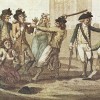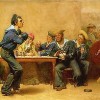In The Myth of the Press Gang, J. Ross Dancy offers a quantitative approach to the subject. He developed a sampling system and entered the details as recorded in individual ships’ muster books covering the period 1793-1801. Data entry took twenty two weeks. The end result was a database including 27,174 individuals, “roughly a 10 […]








